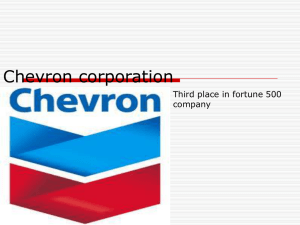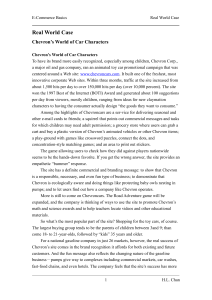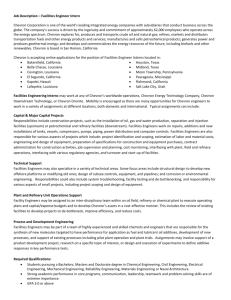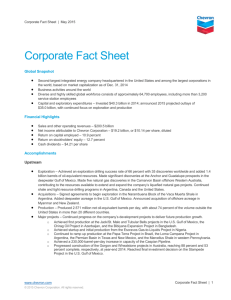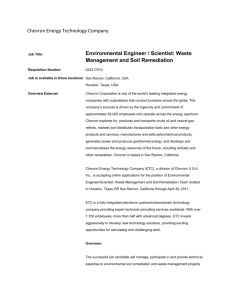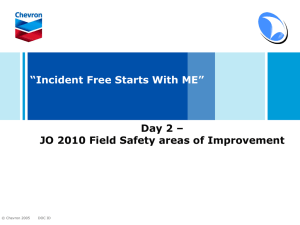Paul F. Bryan - Farm Foundation
advertisement
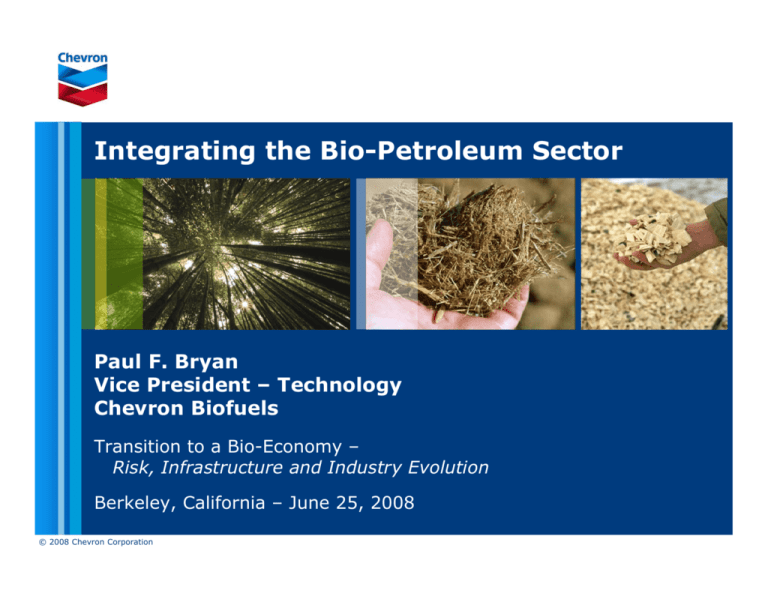
Integrating the Bio-Petroleum Sector Paul F. Bryan Vice President – Technology Chevron Biofuels Transition to a Bio-Economy – Risk, Infrastructure and Industry Evolution Berkeley, California – June 25, 2008 © 2008 Chevron Corporation The Dimensions of Energy Corn: Global corn crop – 680 MMT/year (2007) Corn ethanol – 420 gallons per year (typical for one acre of land – US Midwest) Crude Oil: Global petroleum – 5,000 MMT/year (2007) (1,000 barrels per second or 1/3 x Colorado River) Oil well – 1,500,000 gallons per year (typical for 1.5” pipe – “average” oilfield) © 2008 Chevron Corporation 2 Growth in Renewables – Conventional Crude Oil will not meet consumer demand for motor fuel 20 - MMB/D Shale Oil B ls e u iof u id q i L -tos a G Extra-Heavy Oil and Bitumen 0- 2005 s Coal-toLiquids 2010 2015 2020 2025 2030 Crude Oil (~1000 BPS) © 2008 Chevron Corporation Source: U.S. DOE/EIA Energy Annual 2006 3 Advanced Biofuels Development Large, concentrated supplies of feedstock 2nd-Gen conversion technology Industrial-scale infrastructure le b a n i sta u s s el s Pl u d o m ss e n i s bu Key Components © 2008 Chevron Corporation 4 Feedstock Challenges The three most important things in commercial biofuels: Feedstock Scale Feedstock Cost Feedstock Sustainability Critical Issues: Potential non-food sources: Wood, pulp, paper waste Agricultural waste New oilseed crops Fast-growing grasses & trees Microalgae ● Food / feed vs. fuel ● Land availability ● Subsidies ● Water supplies ● Land-use change ● Regulation © 2008 Chevron Corporation 5 Feedstock Supply Chain Preprocessing Harvesting Storage System Integration Transportation © 2008 Chevron Corporation 6 Biofuels Conversion Technology Create technologies to bring biofuels to an industrial scale: ● Hydrolysis & fermentation ● Pyrolysis ● Gasification ● Emerging technology ● Catalytic conversion to transportation fuels ● Supporting technology © 2008 Chevron Corporation 7 Biofuels Products Fuels & blendstocks: ● Compatible with storage & distribution infrastructure? ● Compatible with existing fleet? ● Compatible in broad blending range with petroleum fuels? ● Meets consumer expectations for superior performance? © 2008 Chevron Corporation 8 Chevron’s Biofuels Business Unit Catchlight Energy LLC 50/50 JV: Chevron + Weyerhaeuser (one of the world’s largest forest products companies) ● WY: Feedstock resources & know-how ● CVX: Products resources & know-how ● Both: (some) Conversion resources & know-how Initial focus on non-food biomass conversion to economical, low-carbon biofuels R&D Alliances (focused on non-food biofuels): National Renewable Energy Laboratory Georgia Tech UC Davis Texas A&M “C2B2” (Colorado Center for Biorefining and Biofuels) © 2008 Chevron Corporation 9
